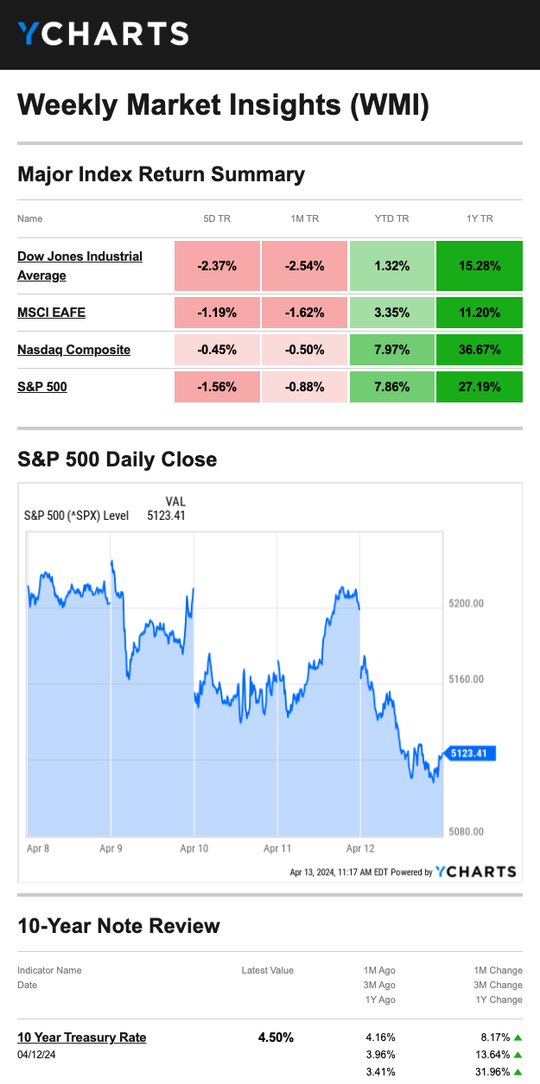Stocks fell last week as investors sorted through conflicting inflation reports and assessed geopolitical tensions.
Inflation Spooks Markets
On Wednesday, the March Consumer Price Index (CPI) report rattled markets, revealing that inflation accelerated slightly more than expected. Bond yields rose, and stocks retreated in response, as investors feared the news could influence the Fed’s rate decision. The 10-year Treasury yield had its highest intraday jump in three years.1,2,3
Markets rallied Thursday as investors were encouraged by the Producer Price Index (PPI) report, which measures inflation at the producer level. Unlike CPI, PPI rose less than expected, which sparked a tech-focused rally. Markets opened lower on Friday as investors wrestled with the conflicting inflation reports.
Fears of an escalating Middle East conflict also weighed on stocks during the week. Concerns about a potential weekend event led some investors to end the week in a risk-off position.4

| Source: YCharts.com, April 13, 2024. Weekly performance is measured from Monday, April 8, to Friday, April 12. ROC 5 = the rate of change in the index for the previous 5 trading days. TR = total return for the index, which includes any dividends as well as any other cash distributions during the period. Treasury note yield is expressed in basis points. |
Inflated Expectations
Minutes from the March Fed meeting, published Wednesday, showed officials’ concern that inflation wasn’t slowing down quickly enough toward the Fed’s 2% target. But despite sticky inflation, they reiterated that rate cuts were still on the table for this year.
The start of Q1 earnings season reinforced inflation concerns as several leading money center banks—despite many beating expectations—forecasted lower growth for the remainder of 2024 due partly to inflation and higher-than-expected rates.
On Friday, the University of Michigan’s survey showed consumer sentiment fell last month. Some concluded that the survey confirmed what consumers have been saying for months—that inflation is still in their everyday lives.5,6
This Week: Key Economic Data
Monday: Retail Sales. Business Inventories. Housing Market Index. Empire State Manufacturing Index.
Tuesday: Housing Starts and Permits. Industrial Production.
Wednesday: EIA Petroleum Status Report. Treasury International Capital. Beige Book. 20-Year Treasury Bond Auction.
Thursday: Jobless Claims. Existing Home Sales. EIA Natural Gas Report. Philadelphia Fed Manufacturing Index.
Source: Investors Business Daily – Econoday economic calendar; April 11, 2024
The Econoday economic calendar lists upcoming U.S. economic data releases (including key economic indicators), Federal Reserve policy meetings, and speaking engagements of Federal Reserve officials. The content is developed from sources believed to be providing accurate information. The forecasts or forward-looking statements are based on assumptions and may not materialize. The forecasts also are subject to revision.
This Week: Companies Reporting Earnings
Monday: The Goldman Sachs Group, Inc. (GS), The Charles Schwab Corporation (CHSW)
Tuesday: UnitedHealth Group Incorporated (UNH), Johnson & Johnson (JNJ), Bank of America Corporation (BAC), Morgan Stanley (MS)
Wednesday: Abbott Laboratories (ABT), Prologis, Inc. (PLD), CSX Corporation (CSX)
Thursday: Netflix, Inc. (NFLX), Elevance Health, Inc. (ELV), Marsh & McLennan Companies, Inc. (MMC), The Blackstone Group (BX)
Friday: The Proctor & Gamble Company (PG), American Express Company (AXP)
Source: Zacks, April 11, 2024
Companies mentioned are for informational purposes only. It should not be considered a solicitation for the purchase or sale of the securities. Investing involves risks, and investment decisions should be based on your own goals, time horizon, and tolerance for risk. The return and principal value of investments will fluctuate as market conditions change. When sold, investments may be worth more or less than their original cost. Companies may reschedule when they report earnings without notice.
1. The Wall Street Journal, April 12, 2024
2. CNBC.com, April 10, 2024
3. The Wall Street Journal, April 11, 2024
4. CNBC.com, April 12, 2024
5. MarketWatch.com, April 11, 2024
6. CNBC.com, April 10, 2024
7. IRS.gov, February 13, 2023
8. Baton Rouge Clinic, January 23, 2023
Investing involves risks, and investment decisions should be based on your own goals, time horizon, and tolerance for risk. The return and principal value of investments will fluctuate as market conditions change. When sold, investments may be worth more or less than their original cost.
The forecasts or forward-looking statements are based on assumptions, may not materialize, and are subject to revision without notice.
The market indexes discussed are unmanaged, and generally, considered representative of their respective markets. Index performance is not indicative of the past performance of a particular investment. Indexes do not incur management fees, costs, and expenses. Individuals cannot directly invest in unmanaged indexes. Past performance does not guarantee future results.
The Dow Jones Industrial Average is an unmanaged index that is generally considered representative of large-capitalization companies on the U.S. stock market. Nasdaq Composite is an index of the common stocks and similar securities listed on the NASDAQ stock market and is considered a broad indicator of the performance of technology and growth companies. The MSCI EAFE Index was created by Morgan Stanley Capital International (MSCI) and serves as a benchmark of the performance of major international equity markets, as represented by 21 major MSCI indexes from Europe, Australia, and Southeast Asia. The S&P 500 Composite Index is an unmanaged group of securities that are considered to be representative of the stock market in general.
U.S. Treasury Notes are guaranteed by the federal government as to the timely payment of principal and interest. However, if you sell a Treasury Note prior to maturity, it may be worth more or less than the original price paid. Fixed income investments are subject to various risks including changes in interest rates, credit quality, inflation risk, market valuations, prepayments, corporate events, tax ramifications and other factors.
International investments carry additional risks, which include differences in financial reporting standards, currency exchange rates, political risks unique to a specific country, foreign taxes and regulations, and the potential for illiquid markets. These factors may result in greater share price volatility.
Please consult your financial professional for additional information.
This content is developed from sources believed to be providing accurate information. The information in this material is not intended as tax or legal advice. Please consult legal or tax professionals for specific information regarding your individual situation. This material was developed and produced by FMG Suite to provide information on a topic that may be of interest. FMG is not affiliated with the named representative, financial professional, Registered Investment Advisor, Broker-Dealer, nor state- or SEC-registered investment advisory firm. The opinions expressed and material provided are for general information, and they should not be considered a solicitation for the purchase or sale of any security.
Copyright 2024 FMG Suite.


